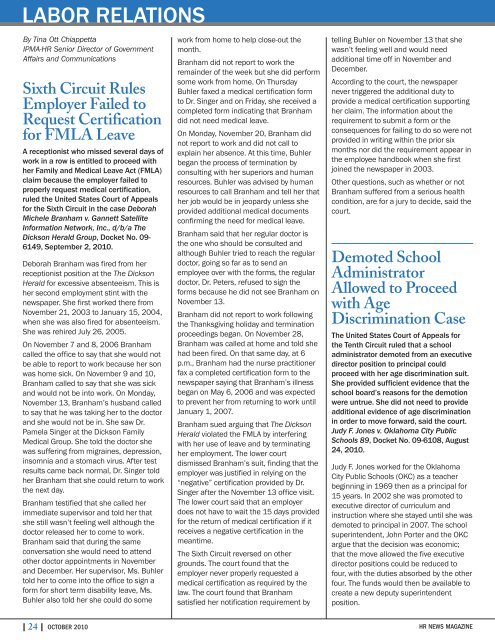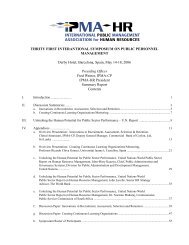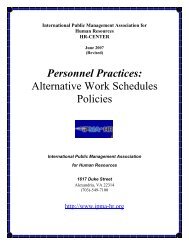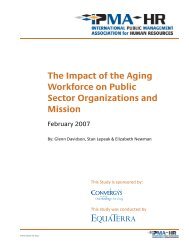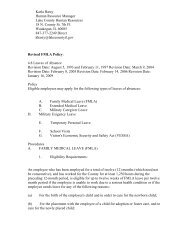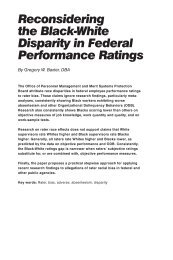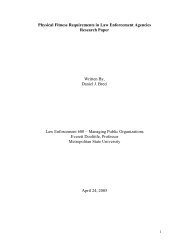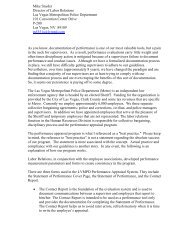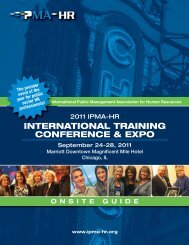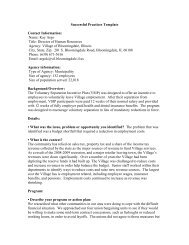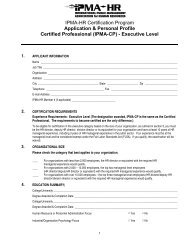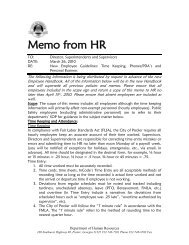October 2010 issue of HR News magazine - IPMA
October 2010 issue of HR News magazine - IPMA
October 2010 issue of HR News magazine - IPMA
Create successful ePaper yourself
Turn your PDF publications into a flip-book with our unique Google optimized e-Paper software.
labor relatioNs<br />
By Tina Ott Chiappetta<br />
<strong>IPMA</strong>-<strong>HR</strong> Senior Director <strong>of</strong> Government<br />
Affairs and Communications<br />
Sixth Circuit Rules<br />
Employer Failed to<br />
Request Certification<br />
for FMLA Leave<br />
a receptionist who missed several days <strong>of</strong><br />
work in a row is entitled to proceed with<br />
her Family and medical leave act (Fmla)<br />
claim because the employer failed to<br />
properly request medical certification,<br />
ruled the united states court <strong>of</strong> appeals<br />
for the sixth circuit in the case Deborah<br />
Michele Branham v. Gannett Satellite<br />
Information Network, Inc., d/b/a The<br />
Dickson Herald Group, docket No. 09-<br />
6149, september 2, <strong>2010</strong>.<br />
Deborah Branham was fired from her<br />
receptionist position at the The Dickson<br />
Herald for excessive absenteeism. This is<br />
her second employment stint with the<br />
newspaper. She first worked there from<br />
November 21, 2003 to January 15, 2004,<br />
when she was also fired for absenteeism.<br />
She was rehired July 26, 2005.<br />
On November 7 and 8, 2006 Branham<br />
called the <strong>of</strong>fice to say that she would not<br />
be able to report to work because her son<br />
was home sick. On November 9 and 10,<br />
Branham called to say that she was sick<br />
and would not be into work. On Monday,<br />
November 13, Branham’s husband called<br />
to say that he was taking her to the doctor<br />
and she would not be in. She saw Dr.<br />
Pamela Singer at the Dickson Family<br />
Medical Group. She told the doctor she<br />
was suffering from migraines, depression,<br />
insomnia and a stomach virus. After test<br />
results came back normal, Dr. Singer told<br />
her Branham that she could return to work<br />
the next day.<br />
Branham testified that she called her<br />
immediate supervisor and told her that<br />
she still wasn’t feeling well although the<br />
doctor released her to come to work.<br />
Branham said that during the same<br />
conversation she would need to attend<br />
other doctor appointments in November<br />
and December. Her supervisor, Ms. Buhler<br />
told her to come into the <strong>of</strong>fice to sign a<br />
form for short term disability leave, Ms.<br />
Buhler also told her she could do some<br />
| 24 | OCTOBER <strong>2010</strong><br />
work from home to help close-out the<br />
month.<br />
Branham did not report to work the<br />
remainder <strong>of</strong> the week but she did perform<br />
some work from home. On Thursday<br />
Buhler faxed a medical certification form<br />
to Dr. Singer and on Friday, she received a<br />
completed form indicating that Branham<br />
did not need medical leave.<br />
On Monday, November 20, Branham did<br />
not report to work and did not call to<br />
explain her absence. At this time, Buhler<br />
began the process <strong>of</strong> termination by<br />
consulting with her superiors and human<br />
resources. Buhler was advised by human<br />
resources to call Branham and tell her that<br />
her job would be in jeopardy unless she<br />
provided additional medical documents<br />
confirming the need for medical leave.<br />
Branham said that her regular doctor is<br />
the one who should be consulted and<br />
although Buhler tried to reach the regular<br />
doctor, going so far as to send an<br />
employee over with the forms, the regular<br />
doctor, Dr. Peters, refused to sign the<br />
forms because he did not see Branham on<br />
November 13.<br />
Branham did not report to work following<br />
the Thanksgiving holiday and termination<br />
proceedings began. On November 28,<br />
Branham was called at home and told she<br />
had been fired. On that same day, at 6<br />
p.m., Branham had the nurse practitioner<br />
fax a completed certification form to the<br />
newspaper saying that Branham’s illness<br />
began on May 6, 2006 and was expected<br />
to prevent her from returning to work until<br />
January 1, 2007.<br />
Branham sued arguing that The Dickson<br />
Herald violated the FMLA by interfering<br />
with her use <strong>of</strong> leave and by terminating<br />
her employment. The lower court<br />
dismissed Branham’s suit, finding that the<br />
employer was justified in relying on the<br />
“negative” certification provided by Dr.<br />
Singer after the November 13 <strong>of</strong>fice visit.<br />
The lower court said that an employer<br />
does not have to wait the 15 days provided<br />
for the return <strong>of</strong> medical certification if it<br />
receives a negative certification in the<br />
meantime.<br />
The Sixth Circuit reversed on other<br />
grounds. The court found that the<br />
employer never properly requested a<br />
medical certification as required by the<br />
law. The court found that Branham<br />
satisfied her notification requirement by<br />
telling Buhler on November 13 that she<br />
wasn’t feeling well and would need<br />
additional time <strong>of</strong>f in November and<br />
December.<br />
According to the court, the newspaper<br />
never triggered the additional duty to<br />
provide a medical certification supporting<br />
her claim. The information about the<br />
requirement to submit a form or the<br />
consequences for failing to do so were not<br />
provided in writing within the prior six<br />
months nor did the requirement appear in<br />
the employee handbook when she first<br />
joined the newspaper in 2003.<br />
Other questions, such as whether or not<br />
Branham suffered from a serious health<br />
condition, are for a jury to decide, said the<br />
court.<br />
Demoted School<br />
Administrator<br />
Allowed to Proceed<br />
with Age<br />
Discrimination Case<br />
the united states court <strong>of</strong> appeals for<br />
the tenth circuit ruled that a school<br />
administrator demoted from an executive<br />
director position to principal could<br />
proceed with her age discrimination suit.<br />
she provided sufficient evidence that the<br />
school board’s reasons for the demotion<br />
were untrue. she did not need to provide<br />
additional evidence <strong>of</strong> age discrimination<br />
in order to move forward, said the court.<br />
Judy F. Jones v. Oklahoma City Public<br />
Schools 89, docket No. 09-6108, august<br />
24, <strong>2010</strong>.<br />
Judy F. Jones worked for the Oklahoma<br />
City Public Schools (OKC) as a teacher<br />
beginning in 1969 then as a principal for<br />
15 years. In 2002 she was promoted to<br />
executive director <strong>of</strong> curriculum and<br />
instruction where she stayed until she was<br />
demoted to principal in 2007. The school<br />
superintendent, John Porter and the OKC<br />
argue that the decision was economic;<br />
that the move allowed the five executive<br />
director positions could be reduced to<br />
four, with the duties absorbed by the other<br />
four. The funds would then be available to<br />
create a new deputy superintendent<br />
position.<br />
<strong>HR</strong> NEWS MAGAZINE


